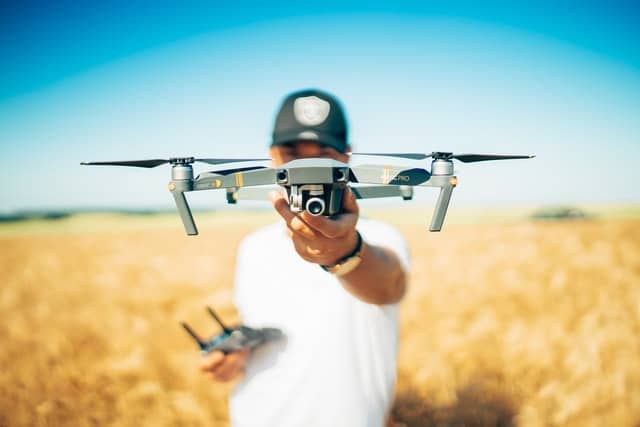Today we are going to be talking about the US drone laws. We will cover what you need to know when flying a drone, how to stay legal, and what happens if you don’t follow the rules.
Flying drones can be tricky since they are a relatively new technology that has yet to have all of the guidelines established for them. In the US, the Federal Aviation Authority (FAA) regulates all drone flights and has a set of guidelines you must follow. With this being said, each state may have different regulations that govern their use so it’s important to research your area before taking off with your drone. If you’re looking for more information on how to fly legally in the US. then keep reading!
Guide To US Drone Laws
The first thing I have to mention is that drone laws in the US, like most other countries in the world, are kind of fluid at the moment. Drone technology is moving at a rapid pace and new laws will always have to formulated to properly regulate drone operation so that they are flown with the safety and security of others in mind.
Do You Have To Be FAA Certified To Fly A Drone?
Drone laws are a confusing subject, and it can be hard to know where you stand when it comes to drone flights. One of the first questions that keep coming up from people looking to purchase a drone, is if you have to be FAA certified to fly a drone?
The answer is both and yes and no, it will depend on the type of drone you have and whether you intend to fly it for recreational or commercial reasons.
For recreational use, you do not need to be FAA certified to fly a drone, however, if you are going to be making money from flying drones, even if it may seem to be a negligible amount, you will need to obtain a drone license and be certified by the FAA.
Do You Need To Register Your Drone With The FAA?
The default position of the FAA is that all drones must be registered unless they weigh less than 250g and you only intend to use them for recreation purposes. If it weighs more than 250g, you will need to register the drone even if you only fly it for fun.
Registering a drone for recreational use costs $5 and is valid for 3 years and it covers every single drone you use for fun. There is no need for separate registration for each drone, you will get a certificate with your registration details, and you must keep this document with you every time you operate the drone.
You must also label your drones with the registration number that is on the certificate, it must be clearly visible on the outside.
Anyone over the age of 13 can register a drone for recreational use, if they are under 13, the drone will need to be registered by their parent, guardian or someone older than 13.
Recreational drone pilots should adhere to the following guidelines established by the FAA:
- Fly only for fun.
- Keep the drone within your visual line of sight.
- The drone must weigh less than 25kg.
- You must never fly near other aircraft and always give way to them
- If you are part of a community-based organisation (CBO) that is recognised by the FAA, you must comply with their rules as well.
- You can only fly in Class G airspace at or below 400 feet, you can attain permission to fly in other airspace classes but still must follow the 400 feet rule.
- Label the drone with your registration number and always keep a digital or hard copy of your registration certificate.
- Always operate the drone with a clear mind and not under any influence of alcohol or drugs.
- Don’t fly over groups of people and places where there are large gatherings like sports events and festivals.
- Don’t fly around areas where emergency response units are in operation.
The FAA along with other interested parties are developing an aeronautical safety test for recreational flyers. It is called The Recreational UAS Safety Test or TRUST for short and it will be required for every recreational flyer to take and pass this test and always carry it around with you for proof if asked by any law enforcement agency or the FAA.
Flying Drone For Commercial Reasons
If you are going to be monetising your drone flights in any way, you will need to register your drone and get an FAA drone license. Just like recreational flyers, there are rules you will have to learn and follow, and these are explored in the FAA’s Part 107 rulebook.
To obtain an FAA drone license and become a certified drone pilot there are some eligibility requirements. The applicant must be over the age of 16, be able to read, write and understand the English language, have the physical and mental capacity to fly a drone safely and pass an aeronautical knowledge exam at an approved FAA testing centre.
The FAA also requires you to renew your drone pilot certificate every 24 months, so that your knowledge stays up to current standards.
A lot of the rules are similar to the ones that recreational flyer must adhere to, but licensed drone pilots will get some additional benefits like having the authorisation to fly at night, fly over people and operate the drone from a moving vehicle. These would have required you to obtain a waiver from the FAA, but recent changes means that is no longer the case and provides a bit more freedom to licensed drone pilots.
You must still follow the 400 feet rule, keep the drone in your visual line of sight and only fly in class G airspace. You may get a waiver for flying in restricted airspace, but this must be obtained from the ATC.
How Much Does It Cost To Get A FAA Drone License?
The fees associated with obtaining an FAA drone license for commercial operations is relatively low. The majority of it will go to an FAA-approved test centre which can cost anything between $100-5175, depending on where the test centre is located.
Registration for a commercial license costs $5 for each drone and is valid for 3 years and you must label your commercial drone with the registration number just like you would for a recreational drone.
If you decide to take a course on passing your FAA drone license test, there will be an additional cost, there are plenty of drone courses that provide training for passing your test and the costs vary but most shouldn’t cost you more than $400. One of the most popular is probably drone pilot school which costs $299 and comes with lifetime support.
Drone Remote ID
New FAA regulations will require every drone, whether you are flying them for recreational or commercial use, be fitted with remote ID capability.
What is remote ID and what is its purpose? Remote ID allows drones to broadcast their location, flight of origin, control station and other flight information to third party receivers like law enforcement and other government agencies.
This is to make sure that everyone is complying with the law and to reduce misuse of drones. All new drones that are to be sold in the US will need to be fitted with remote ID capability and older drones will have to be fitted with hardware or install a piece of software that will provide remote ID features.
Drones Over Private Property
Can you fly drones over private property? As of right now, the FAA has not regulated against flying over private property, so yes you can fly over private property, however, there may some local rules that may restrict what you can do, so always check up what the rules are in the area you are flying in.
Although it is legal to fly over private property and to even record people if they are outside, it is always good manners to get their permission first and try and avoid any disputes that may arise.
Do You Require Drone Insurance?
The FAA does not currently require any drone pilot to get insurance, but this may change in the future and individual states may require you to get liability insurance, so check what the regulations are in your local state regarding drone insurance.
However, I do advise you to get some form of drone insurance for your own protection and especially if you are going to be flying for commercial purposes.
Final Thoughts
Remember, the laws are there to help you operate a drone safely, so it doesn’t endanger others or yourself, so always comply with them.
Drone laws in the US, like many other countries, are being constantly updated, so it is advisable to regularly check the FAA website to see if there have been any significant changes.
References


